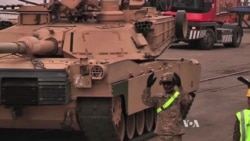The sentencing by Russia this week of an Estonian security official to 15 years in jail for alleged spying is the latest incident amid growing tension between Moscow and the Baltic states. NATO fears Russia is trying to foment unrest among native Russian populations.
Officials from the Baltic states and several NATO members attended the opening Thursday of the bloc’s Strategic Communication Centre of Excellence in Riga, Latvia – a facility aimed at tackling cyber warfare and countering Russian propaganda. Among those at the ceremony was U.S. Senator John McCain.
“This center can help get the truth and the reality to people of all of NATO, including the Baltics, and I am convinced that we can counter that propaganda because that propaganda is false,” said McCain.
Russia analyst Igor Sutyagin of Britain’s Royal United Services Institute warns that Moscow is trying to destabilize the former Soviet Baltic states of Estonia, Latvia and Lithuania – a charge Russia denies.
“There are some provocations, trying to create these social tensions within Estonian society, within the Baltic societies. So it is underway, in this sense the threat is quite realistic, it is here,” he said.
Sutyagin said Moscow is directing the propaganda at so-called non-citizens – that is residents of the Baltic States who hold Russian passports.
“They do not need citizenship. But that does not mean that they want to support Russia, want Russia to come to their life,” he said.
Estonia, Latvia and Lithuania are members of NATO – and entitled to protection under the bloc’s Article 5 on collective defense.
In September 2014 Russia detained Estonian security official Eston Kohver on the shared border – and this week sentenced him to 15 years in jail for spying. Estonia insists he is innocent and was captured on Estonian soil – and that has big implications for NATO, said Sutyagin.
“We already have one occasion of the invasion of NATO territory, in Estonia when Kohver was kidnapped – and no one reacted to that," said Sutyagin. "So that is why the threat is here and that is the lesson. Because salami tactics slice piece-by-piece, and that was the first piece.”
Estonia has responded to the perceived Russian threat by boosting defense spending to 2 percent of GDP. The other Baltic States have not followed suit, according to Lukasz Kulesa of defense policy group the European Leadership Network.
“Lithuania and Latvia – countries that used to speak a lot about their anxiety regarding Russia, but spend around 1 percent GDP on defense,” said Kulesa.
The United States has pre-positioned tanks, artillery and other heavy weapons in Estonia, Latvia and Lithuania. Washington says it is committed to defending their territorial integrity.





